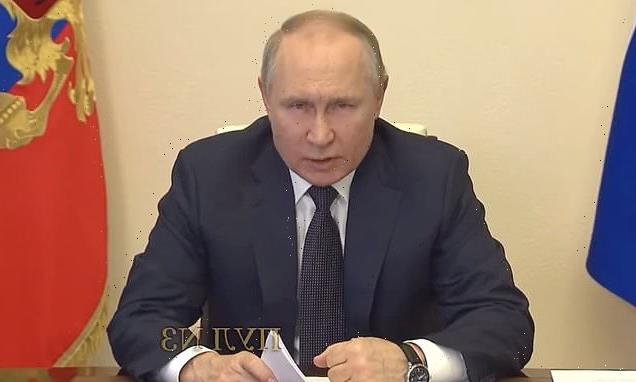UN’s top court orders Putin to stop his invasion of Ukraine as President Zelensky says ignoring the ruling will ‘isolate Russia even further’
- UN’s top court has ruled that Russia must call off its invasion of Ukraine
- But it has no power to enforce the order, meaning Putin is likely to ignore it
- Zelensky warned that pushing on with attacks will isolate Russia further
The UN’s top court has ordered Russian to stop hostilities in Ukraine in a move designed to further isolate Moscow on the world stage.
Kyiv brought a case at the International Court of Justice immediately after Putin ordered his men to attack on February 24, saying his justification – that genocide was being committed in Donbass – was unfounded and in breach of international law.
Judges today ruled in Ukraine’s favour, ordering Russia to call off its forces and stop attacks by troops that it supports – referring to the Donetsk and Luhansk ‘republics’.
The court has no power to enforce the ruling and Vladimir Putin is likely to ignore it, but President Volodymyr Zelensky warned today that doing so will ‘isolate Russia even further’ from other nations.
Vladimir Putin has been ordered to call off his invasion of Ukraine by the UN’s highest court, in a ruling meant to isolate him further on the world stage
‘Ukraine gained a complete victory in its case against Russia at the International Court of Justice,’ he tweeted after the ruling.
‘The ICJ ordered to immediately stop the invasion. The order is binding under international law. Russia must comply immediately. Ignoring the order will isolate Russia even further.’
At the hearings, Ukraine said there is no threat of genocide in Eastern Ukraine, and the United Nations’ 1948 Genocide Convention, which both countries have signed, does not allow an invasion to prevent one.
Putin has described the invasion as a ‘special military action’ needed ‘to protect people who have been subjected to bullying and genocide’ – meaning those whose first or only language is Russian – in eastern Ukraine.
Russia said it skipped World Court hearings on March 7 ‘in light of the apparent absurdity of the lawsuit’.
However, Moscow did file a written document with the court saying the ICJ should not impose any measures.
Russia had argued that Putin’s use of the word ‘genocide’ does not automatically imply that it is basing its actions on the Genocide Convention.
Without a dispute over the interpretation of the treaty, the court has no jurisdiction, Russia argued.
But Presiding judge Joan Donoghue said the court had enough information that the two countries do disagree about the interpretation of the Genocide Convention to make the preliminary decision. Actual jurisdiction would only be decided later.
Russia snubbed a hearing last week at which lawyers for Ukraine accused their powerful neighbor of ‘resorting to tactics reminiscent of medieval siege warfare’ in its brutal assault.
If a nation doesn’t abide by an order made by the court, judges could seek action from the U.N. Security Council, where Russia holds veto power.
In the days since the March 7 hearing, Russia has intensified its military strikes on towns and cities across Ukraine hitting civilian infrastructure across the country.
That includes deadly strikes on a maternity hospital in Mariupol, and sending more than 3million refugees fleeing across borders.
Ukrainian soldiers are pictured attending the funeral of a comrade killed during Russia’s invasion of the country, in Yaorviv
As part of a wider case that could take years to complete at the Hague-based ICJ, Ukraine asked judges to order Russia to ‘immediately suspend the military operations’ launched Feb. 24.
Kyiv said the attacks ‘that have as their stated purpose and objective the prevention and punishment of a claimed genocide’ in the separatist Donbass.
David Zionts, a lawyer in Ukraine’s legal team, called that claim ‘a grotesque lie.’
The request for an order to halt Russia’s attack is linked to a case Ukraine has filed based on the Genocide Convention, which has a clause allowing nations to take disputes based on its provisions to the World Court.
The success of Ukraine’s request will depend on whether the court accepts it has ‘prima facie jurisdiction’ in the case.
Before last week’s hearing, the court’s president, U.S. judge Joan E. Donoghue, sent a message to Russian Foreign Minister Sergey Lavrov on March 1 pressing home the necessity to act ‘ in such a way as will enable any order the Court may make on the request for provisional measures to have its appropriate effects.’
Source: Read Full Article


